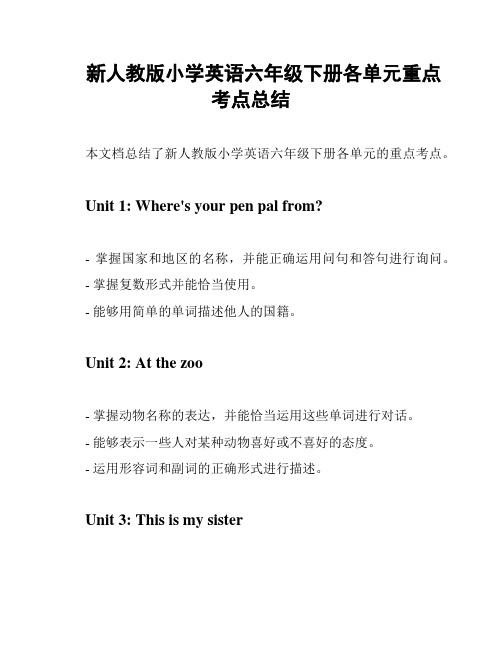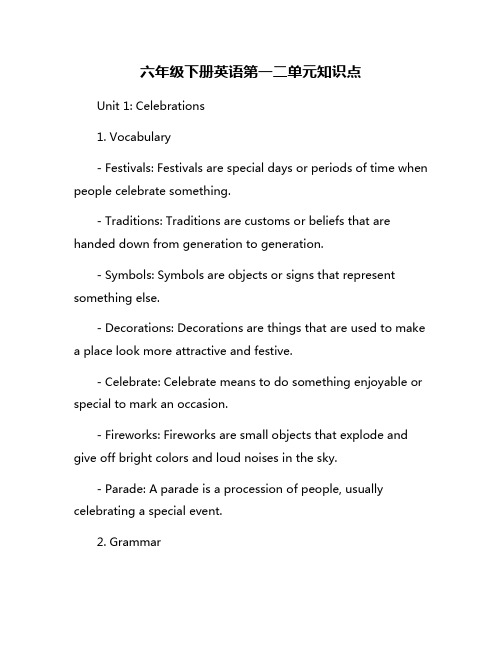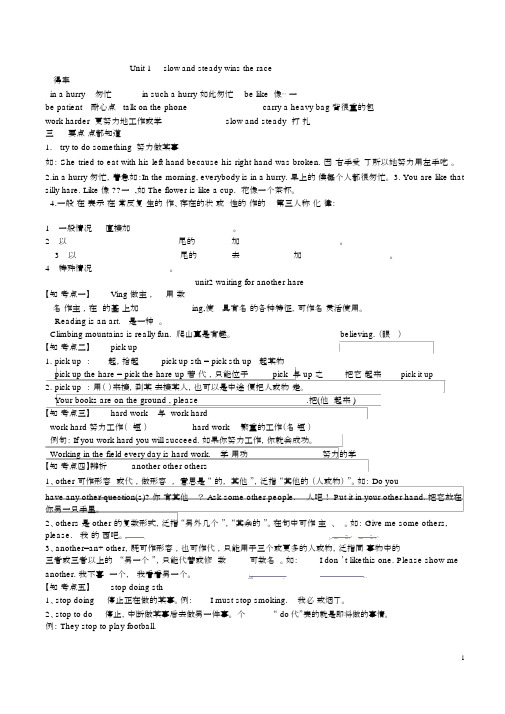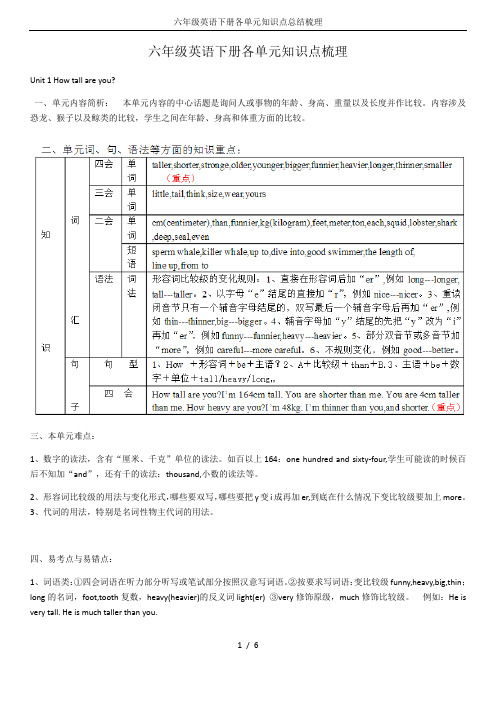广州新版英语六年级下册每单元知识点总结
新人教版小学英语六年级下册各单元重点考点总结

新人教版小学英语六年级下册各单元重点考点总结本文档总结了新人教版小学英语六年级下册各单元的重点考点。
Unit 1: Where's your pen pal from?- 掌握国家和地区的名称,并能正确运用问句和答句进行询问。
- 掌握复数形式并能恰当使用。
- 能够用简单的单词描述他人的国籍。
Unit 2: At the zoo- 掌握动物名称的表达,并能恰当运用这些单词进行对话。
- 能够表示一些人对某种动物喜好或不喜好的态度。
- 运用形容词和副词的正确形式进行描述。
Unit 3: This is my sister- 掌握表示家庭成员关系的词汇,并能在合适的情境下熟练使用。
- 能够用简单的句子表达自己和他人的家庭成员状况。
- 掌握疑问句和肯定/否定回答的语法结构。
Unit 4:What do you usually do on weekend?- 掌握表示日常活动和娱乐爱好的名词和动词,并能在合适的情境下熟练使用。
- 能够描述周末的计划,并能够用适当的时态表达过去、现在和未来的时间。
- 学会以礼貌的方式询问和回答他人的问题。
Unit 5: What's the matter?- 能够描述自己的身体不适,并能运用一些常用的疾病词汇。
- 掌握表示询问、建议和回答的用语,并能在合适的情境下使用。
- 学会表示关心和病愈等祝福的表达方式。
Unit 6: It's raining- 学会用简单的句子描述天气情况,并能表达对不同天气的态度。
- 掌握天气形容词的表达方式。
- 能够描述不同季节的气温、天气和风景。
总之,在学习小学英语六年级下册的过程中,应注重关注以上重点考点,并在实际中多进行运用练习,以此提高英语水平。
六年级下册英语第一二单元知识点

六年级下册英语第一二单元知识点Unit 1: Celebrations1. Vocabulary- Festivals: Festivals are special days or periods of time when people celebrate something.- Traditions: Traditions are customs or beliefs that are handed down from generation to generation.- Symbols: Symbols are objects or signs that represent something else.- Decorations: Decorations are things that are used to make a place look more attractive and festive.- Celebrate: Celebrate means to do something enjoyable or special to mark an occasion.- Fireworks: Fireworks are small objects that explode and give off bright colors and loud noises in the sky.- Parade: A parade is a procession of people, usually celebrating a special event.2. Grammar- Present simple tense: We use the present simple tense to talk about general truths, habits, and routines.- Adverbs of frequency: Adverbs of frequency tell us how often something happens. Some examples are always, usually, often, sometimes, and never.3. Reading and Writing- Reading comprehension: Reading comprehension is the ability to understand and interpret a text.- Writing a diary entry: A diary entry is a personal record of daily events and experiences.Unit 2: Nature1. Vocabulary- Habitat: A habitat is the natural environment where an animal, plant, or organism lives.- Endangered: If a species is endangered, it is at risk of becoming extinct.- Eco-friendly: Eco-friendly means not harmful to the environment.- Pollution: Pollution is the presence of harmful substances in the environment.- Extinct: Extinct means that a species no longer exists.- Conservation: Conservation is the protection and preservation of natural resources.2. Grammar- Modal verbs: Modal verbs are auxiliary verbs that express possibility, necessity, ability, permission, or obligation.- Comparatives and superlatives: Comparatives are used to compare two things, while superlatives are used to compare three or more things.3. Reading and Writing- Descriptive writing: Descriptive writing describes a person, place, or thing in detail.- Writing a persuasive text: Persuasive writing aims to convince the reader of a certain point of view or a call to action.In summary, the first two units of the sixth-grade English textbook cover vocabulary related to celebrations and nature, as well as grammar points such as the present simple tense, adverbs of frequency, modal verbs, and comparatives andsuperlatives. Students also practice reading comprehension, writing diary entries, descriptive writing, and persuasive texts.。
(完整版)广州新版英语六年级下册每单元知识点总结.docx

Unit 1slow and steady wins the race得牢in a hurry匆忙in such a hurry 如此匆忙be like 像⋯一be patient耐心点talk on the phone carry a heavy bag 背很重的包work harder 更努力地工作或学slow and steady 打扎三要点点都知道1. try to do something 努力做某事如: She tried to eat with his left hand because his right hand was broken. 因右手受了所以她努力用左手吃。
2.in a hurry 匆忙,着急如:In the morning, everybody is in a hurry. 早上的候每个人都很匆忙。
3. You are like that silly hare. Like 像 ??一 ,如 The flower is like a cup. 花像一个茶杯。
4.一般在表示在常反复生的作、存在的状或性的作的第三人称化律:1 一般情况直接加_____________________。
2 以 _____________________尾的加_____________________。
3 以 _____________________尾的去___________加___________________。
4 特殊情况 ________________。
unit2 waiting for another hare【知考点一】Ving 做主,用数名作主,在的基上加ing,使具有名的各种特征,可作名灵活使用。
Reading is an art. 是一种。
Climbing mountains is really fun. 爬山真是有趣。
_________ __________ believing. (眼)【知考点二】pick up1. pick up :起,拾起pick up sth = pick sth up 起某物pick up the hare = pick the hare up 若代,只能位于pick 与 up 之把它起来pick it up2.pick up :用()来接,到某去接某人,也可以是中途便把人或物走。
广州版小学英语六年级下每单元知识点

Module 1 ChangesUnit 1 Xiaoling’s New Apartment一、单词★show 出示★change 改变★dark 黑暗的★far away from 远离★close to 靠近★grandma 奶奶,外婆★try 试pillow 枕头comfortable 舒适的kung fu 功夫,武术二、短语1. a lot closer to 离···近得多2. between...and... ···和···之间3. close to 靠近4. far away from 远离5. let me try 让我试试6. much bigger 大得多7. show sb. to sth. 给某人看某物8. show sth. to sb. 把某物给某人看9. welcome to 欢迎到来三、句型1. Let me show you the changes between my oldbedroom and the new one.让我给你们看看我旧卧室和新卧室之间的变化。
OK./ All right. 好吧!2. You are nearer to the school now, aren’t you? 你现在离学校比较近,是吗?3. Your old house isn’t bigger than the new one, isit? 你的旧房子不比新房子大,不是吗?4. The bed and the pillows are presents from mygrandma and grandpa for my new bedroom.这张床和枕头是我爷爷奶奶送给我住新卧室的礼物。
5. Here I come. 我来了!6. My bedroom was nice and clean before, butnow it’s messy.之前我的卧室又漂亮又干净,可现在乱七八糟的。
最新广州版六年级英语下册Unit2知识点及练习题

一、课堂导入Fable: Waiting for another hare (守株待兔)二、复习预习引导学生以提问、回顾、抽测笔记的形式复习上节课所学的知识点。
针对上节课的作业进行讲评、订正、答疑,并通过描述曾经与现在生活变化导入本节课所要学习的新内容。
三、知识讲解知识点1:词汇短语详解1. wait v.….等待常见的用法:wait for sbe.g. Someone is waiting for you. 有人正在等你呢。
2.suddenly adv.突然地,忽然地该词由adj sudden加了后缀ly 构成副词-----suddenly还有哪些形容词加ly变成副词呢?类似的有: slow----slowly quick----quickly brave---bravely3. crash v 碰撞短语:crash intoe.g. The car crashed into the tree yesterday. 昨天那个车子撞上那个树。
4. appear v 出现反义词:disappear(消失)5. go for it 加油知识点2 课文重点句型讲解1. One day a farmer was working in the field. 一天,一个农夫在地里干活。
主语+was/were doing sth (过去进行时态)过去进行时态:用来讲述过去某个时间正在发生的事情。
将现在进行时中的be动词am, is, are变为was, were就构成过去进行时了。
eg: He was doing his homework when I got home last night. 我昨晚回到家的时候他正在做作业。
They were watching TV when you called. 你打电话来的时候他们正在看电视。
2. He picked up the hare and took it back home. 他捡起兔子拿回家。
六年级英语下册各单元知识点总结梳理

六年级英语下册各单元知识点梳理Unit 1 How tall are you?一、单元内容简析:本单元内容的中心话题是询问人或事物的年龄、身高、重量以及长度并作比较。
内容涉及恐龙、猴子以及鲸类的比较,学生之间在年龄、身高和体重方面的比较。
三、本单元难点:1、数字的读法,含有“厘米、千克”单位的读法。
如百以上164:one hundred and sixty-four,学生可能读的时候百后不知加“and”,还有千的读法:thousand,小数的读法等。
2、形容词比较级的用法与变化形式,哪些要双写,哪些要把y变i成再加er,到底在什么情况下变比较级要加上more。
3、代词的用法,特别是名词性物主代词的用法。
四、易考点与易错点:1、词语类:①四会词语在听力部分听写或笔试部分按照汉意写词语。
②按要求写词语:变比较级funny,heavy,big,thin;long的名词,foot,tooth复数,heavy(heavier)的反义词light(er) ③very修饰原级,much修饰比较级。
例如:He is very tall. He is much taller than you.2、语法、句型类:①How引导的不同特殊疑问句:How be sb.?(问某人状况),How tall/heavy/old be sb./sth?(询问身高、体重、年龄)How long/big/large be---?(问多长、多大)How many/much(问数量、价格)。
②比较级的运用,一定要是相同内容或类别才可以进行比较,这是学生最易出错和混淆娥地方。
例如:Mike’s legs are longer than(John),如果学生翻译会直接填写John,但是一分析就不难发现应该和John的腿作比较的,所以应该是John’s。
再比如My hair is longer than (she).如果不仔细分析大多数学生都会错填成:she,her,但是填hers才是正确的。
新人教版六年级英语下册第一单元至第四单元知识点归纳精编版

新人教版六年级英语下册第一单元至第四单元知识点归纳精编版MQS system office room 【MQS16H-TTMS2A-MQSS8Q8-MQSH16898】小学六年级英语下册 Unit 1 How tall are you?知识点归纳一、必背词汇tall ------ taller 高的----更高的dinosaur 恐龙short ------ shorter 矮的/短的----更矮的/更短的hall 大厅long ------ longer 长的----更长的than 比strong------ stronger 强壮的----更强壮的both 两个都old ------ older 老的/旧的----更老的/更旧的meter 米形容词 young------ younger 年轻的----更年轻的kilogram千克;公斤adj. small------ small 小的----更小的 others size 号码thin ------ thinner 瘦的----更瘦的feet 脚heavy------heavier 重点----更重的wear 穿low------ lower 低地----更低地countryside乡村smart------smarter 聪明的 ----更聪明的shadow 影子;阴影become变成;开始变得辅+元+辅 --------双写最后一个辅音字母+er辅音字母+y -----改y为i +erbig-----bigger 大的-----更大的 happy-----happier 开心的-----更开心的thin-----thinner 瘦的-----更瘦的 heavy-----heavier 重的------更重的fat-----fatter 胖的------更胖的 funny-----funnier 滑稽的-----更滑稽的二、重点句型⑴ 问年龄,身高,体重等How old are you? How tall are you? How heavy are you?- I’m _______ (years old). -- I’m ______metres tall. --- I’m ______ kilograms .⑵ 问物品的情况:① How large is your room? 你的房间有多大?It’s __________ m2 (square meters.) 有_______ 平方米。
六年级下册英语知识点复习总结

六年级下册英语知识点复习总结六年级下册英语知识点复习总结在平平淡淡的学习中,大家最不陌生的就是知识点吧!知识点也可以理解为考试时会涉及到的知识,也就是大纲的分支。
哪些知识点能够真正帮助到我们呢?以下是店铺为大家整理的六年级下册英语知识点复习总结,欢迎阅读,希望大家能够喜欢。
小学六年级下册英语知识点:第三单元四会单词:watch—watched 看wash—washed 洗clean—cleaned打扫play—played玩 visit—visited 看望do—did last weekend上一个周末 go—went去go to a park—went to a park 去公园go swimming—went swimming去游泳go fishing—went fishing去钓鱼read—read 读go hiking—went hiking 去郊游四会句型:What did you do last weekend? 你上个周末干什么了?I played football. 我踢足球了。
Did you read books? 你读书了吗?Yes, I did.是的,我读了。
No, I didn’t. 不,我没有。
应该掌握的知识点:1、关于一般过去时一般过去时态:表示过去某一时间所发生的动作或存在的状态。
谓语动词要用一般过去式。
经常与yesterday(昨天), last week(上周), last month(上个月), last year(去年), two months ago(两个月前), the day before yesterday(前天),in 1990 (在1990年), in those days (在那些日子里)等表示过去的时间状语连用。
如: I was born in 1990. (我出生在1990年)。
When did you go to the park? (你是什么时候去的公园)。
- 1、下载文档前请自行甄别文档内容的完整性,平台不提供额外的编辑、内容补充、找答案等附加服务。
- 2、"仅部分预览"的文档,不可在线预览部分如存在完整性等问题,可反馈申请退款(可完整预览的文档不适用该条件!)。
- 3、如文档侵犯您的权益,请联系客服反馈,我们会尽快为您处理(人工客服工作时间:9:00-18:30)。
Unit 1 slow and steady wins the race词组记得牢in a hurry 匆忙in such a hurry 如此匆忙be like 像…一样be patient 耐心点talk on the phone 讲电话carry a heavy bag 背很重的包work harder 更努力地工作或学习slow and steady 稳打稳扎三要点难点都知道1.try to do something 努力做某事如:She tried to eat with his left hand because his right hand was broken.因为右手受伤了所以她努力用左手吃饭。
2.in a hurry 匆忙,着急如:In the morning, everybody is in a hurry. 早上的时候每个人都很匆忙。
3. You are like that silly hare. Like 像??一样,如The flower is like a cup. 这花像一个茶杯。
4.一般现在时表示现在经常反复发生的动作、存在的状态或习惯性的动作的时态动词第三人称变化规律:1一般情况直接加_____________________ 。
2以_____________________ 结尾的单词加_____________________。
3以_____________________结尾的单词去___________加___________________。
4特殊情况________________。
unit2 waiting for another hare【知识考点一】Ving做主语,谓语动词用单数动名词作主语,在动词的基础上加ing,使该动词具有名词的各种特征,可作名词灵活使用。
Reading is an art. 读书是一种艺术。
Climbing mountains is really fun. 爬山真是有趣。
_________ __________believing.(眼见为实)【知识考点二】pick up1.pick up :捡起,拾起pick up sth = pick sth up 捡起某物pick up the hare = pick the hare up若为代词,只能位于pick 与up之间把它捡起来pick it up2.pick up :用(车)来接,到某处去接某人,也可以是中途顺便把人或物带走。
Your books are on the ground , please_______________________.(把他们捡起来)【知识考点三】hard work 与work hardwork hard努力工作(动词短语)hard work 繁重的工作(名词短语)例句:If you work hard you will succeed.如果你努力工作,你就会成功。
Working in the field every day is hard work. 学习用功____________ 努力的学习【知识考点四】辨析another other others1、other可作形容词或代词,做形容词时,意思是“别的,其他”,泛指“其他的(人或物)”。
如:Do you have any other question(s)? 你还有其他问题吗?Ask some other people. 问问别人吧!Put it in your other hand. 把它放在你另一只手里。
2、others是other的复数形式,泛指“另外几个”,“其余的”。
在句中可作主语、宾语。
如:Give me some others, please. 请给我别的东西吧。
3、another=an+ other,既可作形容词,也可作代词,只能用于三个或更多的人或物,泛指同类事物中的三者或三者以上的“另一个”,只能代替或修饰单数可数名词。
如:I don’t like this one. Please show me another. 我不喜欢这一个,请给我看看另一个。
【知识考点五】stop doing sth1、stop doing停止正在做的某事。
例:I must stop smoking.我必须戒烟了。
2、stop to do停止,中断做某事后去做另一件事。
这个“do”代表的就是即将做的事情。
例:They stop to play football.【知识考点六】from then onfrom then on 从那时起from now on 从现在起have nothing to eat 没东西吃have nothing to say 没话说have nothing to to 没事可做【知识考点九】One day, a farmer was working in the field.使用的是过去进行时态。
过去进行时用来讲述过去某个时间正在发生的事情。
将现在进行时中的be动词am, is, are变为was,were就构成过去进行时了。
例如:They were watching TV when you called.【知识考点十】一般过去时动词过去式变化规则:1.一般在动词末尾加-ed,如:pull-pulled, cook-cooked2.结尾是e加d,如:taste-tasted3.末尾是辅音字母加一个元音字母和一个辅音字母的重读闭音节,应双写末尾的辅音字母,再加-ed,如:stop-stopped4.以“辅音字母+y”结尾的,变y为i,再加-ed,如:study-studied词组记得牢Play a game 玩个游戏back leg 后腿Look like 看起来像king of the animals 动物之王要点难点都知道1. 英语语法之肯定句变否定句,肯定句变否定句口诀,给句子分析它,看它结构是哪个主加be后加not 其他一切全照抄,主加动词主重要,don't doesn't 来帮忙,don't doesn't 中间夹doesn't doesn't 最特殊第三人称单数全靠它。
Unit 4 We can save the animals +-词组记得牢Many other 其他许多的in danger 处于危险中Disappear forever永远消失cut down forests 砍伐森林Pollute ocean 污染海洋have no place to live in 没有的地方生活Things made from animals 动物制成品do something about it 为此做点生么Plant trees 栽种树木work together共同努力,合作Save the animals 挽救动物要点难点都知道1.肯定句中并列部分最后两个词用and 连接,否定句中用or 连接,如:I have a rabbit, a cat and two birds. She doesn’t have any toys or pets.2.Many people buy things made from these animals, like medicines, fur coats and even foods.Like 意思是:“如,诸如” Chinese are good at sports like badminton, table tennis and swimming.3.never 开头的祈使句表示强烈的否定,相当于“千万不要,一定不要”:Module 3 Famous people主要短语:about a famous historical person(有关于一位著名的历史人物)、be born in /on…the father of modern China, go on,try to+动词的原形,started to+动原,begin to +动原,make a speech, in the forest, take from…, give to …, find – found,hold-held, pay-paid(支付),in the end, become poorer and poorer.职业:writer, painter, inventor, musician, scientist, film star, composer, politician, coach, dancer, singer, architect,主要句型:1. Dr Sun Yatsen was born in Guangdong.(地点前用in)He was born in 1866.(年和月前用in) I was born on August 17th, 1998.(有具体的日期时,用on)2. What do you mean?(你指的是什么意思?)3.He was against the emperor.4. He tried to change China and free the people.5.In 1976, the Chinese people lost their Premier Zhou Enlai. =Premier Zhou Enlai died in 1976.6. It doesn’t matter.(没关系)7. Can you tell me more about him?(注意more的位置)8. When was he born and when did he die?------ He was born in 1881 and died in 1936.主要语法:1、I think he loved the people and the people loved him.(宾语从句)He died in 1791 when he was 35years old.(时间状语从句)2、In the 14th century 在14世纪(指从1300年-1399年)3、the +形容词是指某一类的人。
the poor 指穷人。
4、be 动词+行为动词的过去分词构成了被动语态。
被动语态中的动词时态仍旧要考虑。
The 2008 Olympic Games were held in Beijing.(已经举行了,所以用被动语态的过去时态)The 2010 Asian Games will be held in Guangzhou.(还未举行,用被动语态的将来时)年代的读法●大多数的没有“0”的年代都是看作两个十位的数字来说比如:1981 nineteen eighty-one●但是有零的就不一样了:1)三个零:就是把年代直接读作 ...thousand 如:2000 two thousand2)两个零在中间:要读作:... thousand and ... 如:2008 two thousand and eight3)两个零在结尾:要把前面两个数字读成十位数,后面加上hundred如:1900 nineteen hundred4)一个零在百位,一个零在个位:读作:...thousand and ...ty 如:1090 one thousand and ninety5)只有一个零在个位:仍旧看成两个十位数来读如:1990 nineteen ninety6)只有一个零在十位:前面两位当作十位数来读,十位的零读作“oh”,个位直接读如:1906 nineteen oh six7)只有一个零在百位:有两种读法:第一种读法:仍旧看成两个十位数来读如:2015 twenty fifteen第二种读法:读作 ... thousand and ... 如:2015 two thousand and fifteen8)公元前BC 公元ADUnit 8 The magic words词组记得牢in the middle of 在…中间walk through a park 穿过公园many more 其他更过的none of them 没有一个cry out 喊出声at the bottom of 在…的底部A tree with a sign on it 一颗挂着牌子的树lead to 通向…the best party ever 最好的派对this is why…这就是…的原因full of…满是…三、要点难点都知道1.情态动词:should表示“应该,劝告,建议,命令”否定为shouldn’tI should help her because she is in danger.她现在处于危险中,我应该帮助她。
